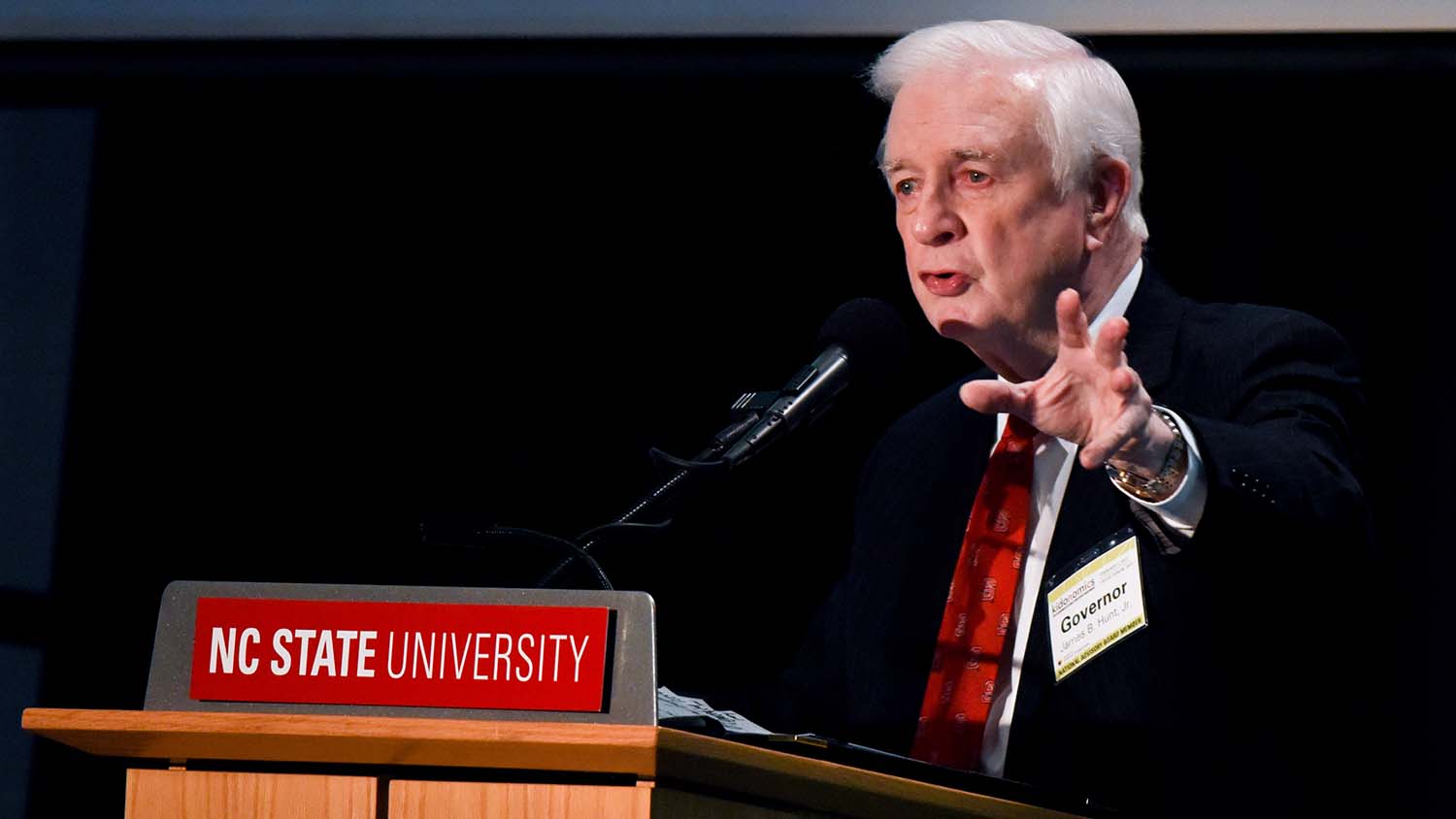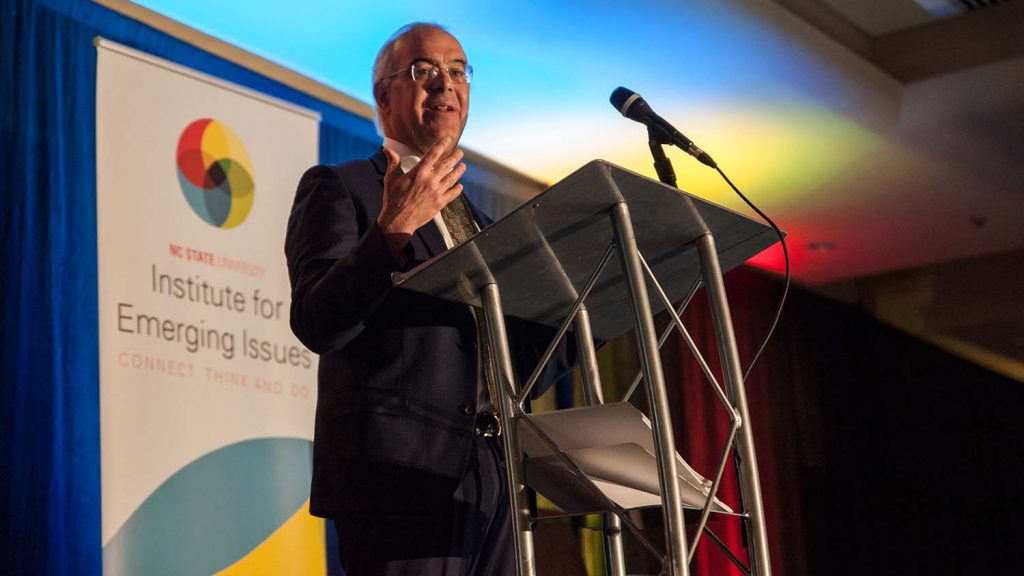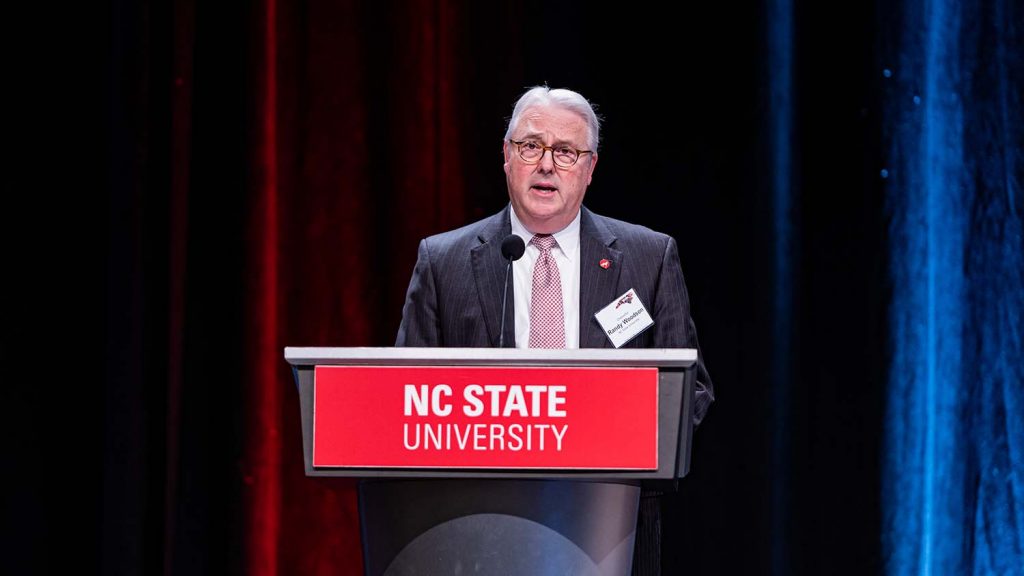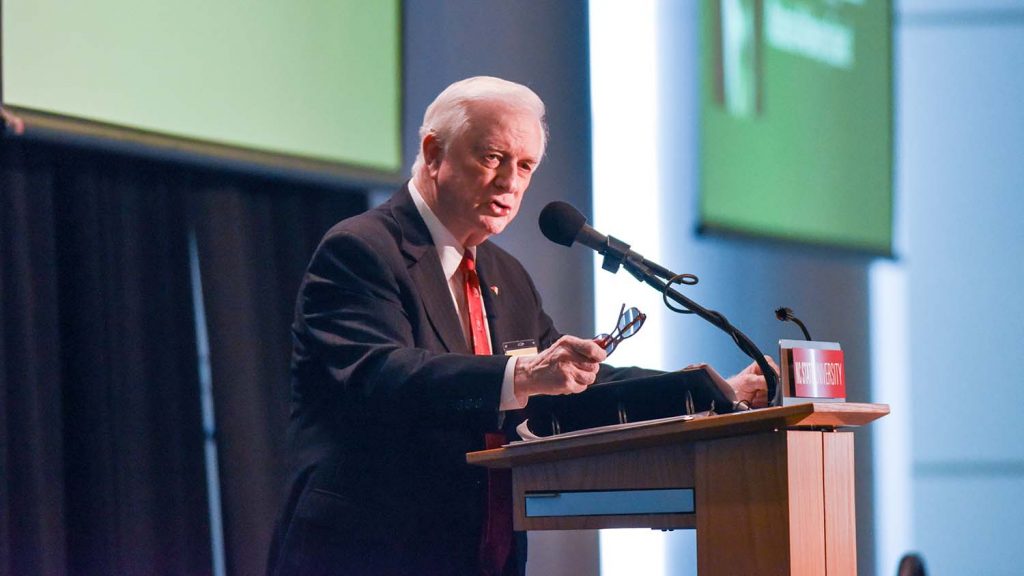Virtually Essential: Emerging Issues Forum at 35
NC State’s Institute for Emerging Issues prepares to host its 35th annual forum, a four-day, all-virtual event that will conclude the six-part series called Reconnect NC. What started as a request from Chancellor Bruce Poulton to Gov. James B. Hunt Jr. is now a full university-hosted institute on Centennial Campus.

In the winter of 1994, when First Lady Hillary Clinton’s plane became ice-bound in Washington, D.C., and she was unable to fly to Raleigh for her appearance as one of three keynote speaker for the ninth annual Emerging Issues Forum, university officials scrambled to find closed-circuit television technologies to turn her appearance into one of the state’s first-ever virtual conferences.
Something similar happened in 2010 when Secretary of Education Arne Duncan was scheduled to speak about the creative visions for the future of North Carolina education, but was unable to physically attend the conference because of a Washington snowstorm. So he walked to his office, fired up an early virtual teleconferencing system and joined Minnesota Gov. Tim Pawlenty and the Manchester Craftsman Guild’s Bill Strickland on the topic of crafting creative solutions.
Even in the earliest days of the internet and before Zoom became a ubiquitous platform, NC State’s think-and-do institute has been charged with uncovering, considering and finding solutions for issues that will affect the lives of all North Carolinians, even if that requires technologies of the future to make sure it happens.
Next week, Feb. 15-18, IEI will host its 35th annual forum in Raleigh, four days of virtual meetings in the final installment of the www.reconnectnc.org series.
What started in 1986 as a request by the late Chancellor Bruce Poulton to Gov. James B. Hunt Jr. to create an annual forum to address emerging issues has grown into a lively nonpartisan institute with a dozen and a half staffers, led since 2017 by Director Leslie Boney. Fittingly, the institute that was created in 2002 moved into the Hunt Library when it opened in 2012.
The Forum and Institute
The idea for the forum and the institute that emerged from it was simple: to ask world and national leaders to consider issues identified by IEI that would face North Carolinians and to begin identifying solutions, from healthcare to biotechnology to education to the ongoing rural and urban divide.

“I always wanted North Carolina to follow in its tradition of being first,” says Hunt, a two-time NC State graduate and North Carolina’s only four-term governor (1977-85, 1993-2001). “I always wanted us to be on the cutting edge. I wanted us to spot the issues first and focus on what the cutting-edge ideas are that we need to know about, then begin to figure out how we could do something about them.”
It was not a small undertaking. Initially, Hunt relied on his vast network of world and national leaders, making sure he had balanced voices participating. In 2005, when former Democratic President Bill Clinton spoke at Reynolds Coliseum, former Republican Speaker of the House Newt Gingrich also addressed the topic of “Making Healthcare Work in North Carolina.” The list of world thought leaders — including former Presidents Clinton and Jimmy Carter, U.S. senators and representatives, cabinet members, business leaders and journalists — is exactly what Hunt’s Facebook friends list would look like.
“It’s the kind of thing NC State ought to be about,” Hunt says. “NC State was created to involve the people and find practical ways of solving problems for the people of the state. We ought to be getting ideas out to the people, stimulating their ideas about those issues, and encouraging them to develop new and better approaches.
“Some of that is done at a high level, general level. Some of it’s done locally. There’s always a need to spot the next issues. What has great potential to improve our lives? What do we need to learn about, and then what do we need to do about it?”
First and foremost, IEI is about improving North Carolina. But it’s also about reaching out to the best minds on the planet to discuss the ways to make that happen.

“We absolutely admit to having a North Carolina lens,” Boney says. “But we are agnostic about where a great idea comes from. It could come from another country. It could come from another state. It could come from a small town in eastern or western North Carolina.
“We are idea enthusiasts. And so we try to collect ideas.”
Hunt is the collector of idea-makers. As was always the case during his political career, few people could say no when he asked them to participate.
“If you’ve ever been at the other end of a Jim Hunt conversation, it often concludes with a request,” says Chancellor Randy Woodson. “Whether it’s over the phone or in person, you can feel him grabbing your elbow, shaking your hand, gently pulling you forward, and then asking you the question ‘Will you do this?’
“And everyone says the same thing, ‘I couldn’t say no to Gov. Hunt.’ I’m so proud that NC State has been associated with the institute through the years. It has provided great leadership.”
Everyone has that same bruise on their triceps, and Hunt almost always gets done what he wants.
A Different Leadership
Over the past few years, Hunt has stepped back and Asheville business leader Jack Cecil has stepped up as board chair. Boney was hired from the UNC System Office in 2017 to lead the institute and develop a different kind of outreach and engagement, turning the once-a-year forum into a twice-a-year traveling roadshow to include more communities across the state.
Boney has made some tweaks to the institute’s charge and those changes have been the basis for the dozens of local and community initiatives represented in the Reconnect NC programs, showing how organic solutions can be scaled up for greater change. Topics were crowdsourced from engaged participants from across the state and ideas were shared at events in Asheville, Charlotte and Raleigh.
“We started out with the idea that this was going to be a great chance for North Carolina to learn from the nation and the world,” Boney says. “Now, we are more likely to use the forum to learn from the nation, the world and our own communities.

“Second, we have tried to ensure that we aren’t just sharing information at the forum and inspiring people and then going home. We want to do those things, then have them go find an organization in the state that can take an idea and do something with it, or find a way for the institute to move forward with that idea itself.
“Third, the original idea was that the way change happens is top down, that someone hears an idea and passes a law. We hope that we are able to show that ideas can go from middle out. Change can be led by faith institutions in a community, local government, nonprofits or informal coalitions on a community level. More and more, we are paying a little bit more attention to the power of local communities to launch change.”
In other words, even a forum dedicated to the idea of identifying emerging issues can find new ways to identify and discuss new and ongoing solutions.
“Leslie’s leadership has really created this opportunity for more community engagement through community-based forums, really lifting them up across all the regions in our state,” Woodson says.
Topics and Speakers
1986: Innovation and Competition: The Challenge to America
1987: Winning In The Global Economy
1988: Taking Control of the Future. (featuring Bill Clinton)
1989: Education For a Competitive Economy
1990: Global Changes In The Environment: Our Common Future (featuring Carl Sagan)
1991: Changes in Europe: Challenges for America (featuring Jimmy Carter)
1992: Priorities for America’s Future
1993: Strengthening America: New Economic Strategies
1994: Investing in Health: An American Agenda. (featuring Hillary Clinton)
1995: Conflict, Competition, Cooperation: Power Politics in a Changing World. (featuring Ambassador Madeleine Albright)
1996: The Knowledge Explosion: What the Payoff for Americans?
1997: Economic Forces: Shaping the Next Half-Century
1998: People and Planet: A Fragile Partnership
1999: Global Economic Storms (featuring Al Gore)
2000: Shaping our Common Future
2001: First in America: Charting the Course for Excellent Schools
2002: Biotechnology and Humanity at the Crossroads of a New Era
2003: Jump Starting Innovation: Government, Universities & Entrepreneurs
2004: Creative Responses for Global Economic Change
2005: My Health Is Your Business: Making Healthcare Work in North Carolina (featuring Bill Clinton)
2006: Financing the Future (featuring Steve Forbes)
2007: Transforming Higher Education: A Competitive Advantage for North Carolina (featuring U.S. Secretary of Education Margaret Spellings)
2008: North Carolina’s Energy Futures: Realizing a State of Opportunity (featuring Jeffrey Immelt)
2009: Changing Landscapes: Building the Good Growth State? (featuring David Brooks)
2010: Creativity, iNC (featuring U.S. Secretary of Education Arne Duncan)
2011: An Idea Exchange for Healthcare (featuring Indra Nooyi)
2012: Investing in Generation Z
2013: @Manufacturing Works
2014: Teachers and the Great Economic Debate
2015: Innovation Reconstructed
2016: FutureWork
2017 Focus Forum: Kidonomics: The Economics of Early Childhood Investment
2018: Kidonomics: Investing Early in Our Future.
Reconnect NC Forum Series
Fall 2018: Reconnect to Community (featuring David Brooks) | Asheville, NC
Spring 2019: Reconnect to Rural and Urban | Raleigh, NC
Fall 2019: Reconnect to Economic Opportunity | Charlotte, NC
Spring 2020: Reconnect to Technological Opportunity | Raleigh, NC
Fall 2020: Reconnect to Well-Being | via webinar
Spring 2021: Reconnect for the Future | via webinar
- Categories:


